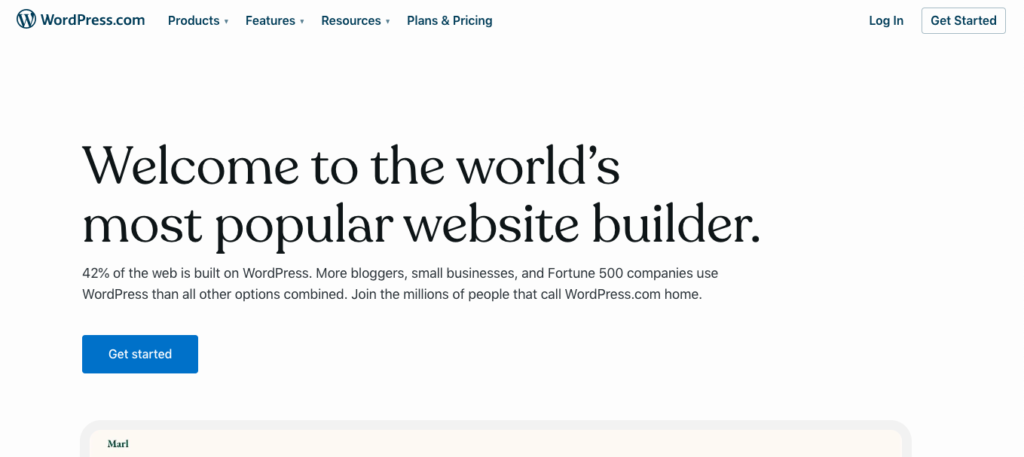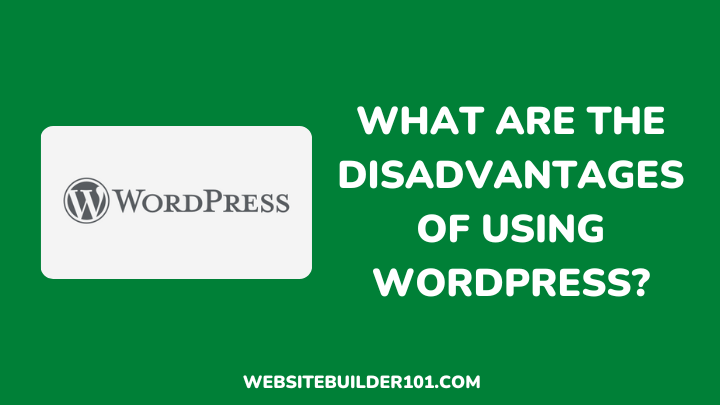As we all know, WordPress has loads of benefits, some of which include access to professional themes, analytics, reporting, etc. But should that make you ignore WordPress’ disadvantages? Absolutely not.
Learning about the disadvantages of WordPress can put you in a better position in terms of creating and managing your website.
So let’s go over the details together in this guide. Here are the disadvantages of WordPress.

1. Limited customization
WordPress has over 8,000 themes and templates. But it may surprise you that you cannot fully customize most, if not all, of them. The reason is that these extra features come at a fee, which, though not so expensive, will still cost you.
This can be a limitation if you’re on a tight budget but still need the full features of your installed theme.
2. Security concerns
WordPress.org is an open-source platform. This implies that it is vulnerable to hacking and other security threats.
Luckily, you can improve the security of your website by using an SSL certificate from your hosting provider or by downloading a free SSL plugin on your WordPress website.
This is essential because it will also give users a sense of security while browsing your website. Plus, it wards off potential attacks from hackers.
3. Slow loading times
WordPress websites can sometimes load very slowly. This can happen for a lot of reasons. One is that your images are very large, or your content isn’t optimized for speed.
Either way, a slow website can quickly irritate your visitors and cause them to source for answers on your competitor’s pages.
If your WordPress website is loading too slowly, or you don’t know its current state, tools like GTmetrix can show you your site speed.
It will also give you various suggestions for making your website load faster. So give it a try as soon as you can.
4. Limited scalability
A WordPress website can handle high traffic, reaching a million monthly visits. But how well this would happen depends on your hosting provider’s optimization techniques.
Another issue is that you can only have as many as 100 pages on WordPress.
This is because the URL mechanism and hierarchy of a WordPress page are different from that of the post section. Both examples can cause limited scalability.
5. Complex to use
We can all agree on the fact that WordPress is user-friendly. However, you may have difficulty knowing what plugins to install if it’s your first time building a WordPress website.
Luckily, WordPress has lots of resources and a thriving community where you can get some help. There are also many review blogs on WordPress where you’re likely to get tested and proven answers.
WordPress can get too complex to use at first, but if you use these tips and ask the right question and use resource tools like Youtube, you should find your way around it better.
6. Too many plugins can slow down your site
Although WordPress has a lot of plugins, there’s not enough reason to download most or even all of them. This is because some plugins can slow down your site in ways you do not expect.
If you’ve already installed several of them, ask yourself a simple question: Which ones do I need? Keep only the necessary ones and delete the rest. Preferably, your site plugins should be between 1 and 8 for best results.
7. Constant upgrades
WordPress is a constantly evolving platform, and users must keep up with the latest updates and upgrades.
This helps to ensure that their website remains compatible and secure. When some users see the upgrade notification, they are likely to ignore it.
This is because they are not 100% sure how the upgrade will affect their site.
Why don’t people use WordPress?
You can add this to your list of the disadvantages of using WordPress: some developers find WordPress to be a bit restricting. Hence, they’ll rather create their clients’ websites from the ground up and implement all the ideas they have in their heads.
Another possible reason people don’t use WordPress is that they prefer alternative website builders.
For instance, if you’re creating an eCommerce store, you may want to opt for Shopify over WordPress because it is more eCommerce-friendly and may offer better security features.
This saves you the effort of installing WooCommerce on WordPress and setting it up.
FAQs
Is it safe to use WordPress?
Yes, it is. Although WordPress is a major target of hackers and spammers, it’s still a safe zone.
To protect yourself, use a strong password and an SSL certificate and when not in use, consider logging out of your dashboard.
Is WordPress enough to build a website?
Yes, it is. With WordPress, you can build a professional website and every other type you can imagine.
Does updating WordPress affect your site?
Yes, it does. But not necessarily in an adverse way. The updates will affect your core WordPress files and folder.
Conclusion
WordPress is a versatile website builder. It has thousands of themes that are easy to customize. This is aside from its wide range of plugins that can help improve the speed of your site and overall performance.
Despite all these, the disadvantages of using WordPress still exist. One such example is that installing too many plugins or a heavy-loading theme can slow down your site and make it difficult to navigate.
There are other disadvantages in this guide; you can review them one more time to familiarize yourself with them.
Thanks for reading.
Want to learn more about WordPress? Find other helpful guides here on WebsiteBuilder101.
